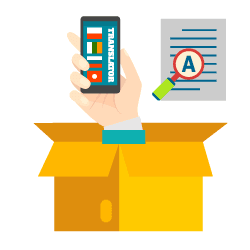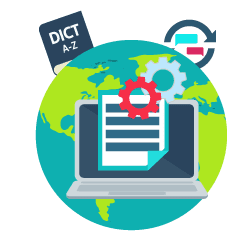
IT translation is the translation of IT related stuff. Information technology has now become an essential part of every field of human life and every type of modern facilities, with rare differences, are either devices implemented with embedded computers or options of connecting the system with computer power. As a practice, such documentation usually contains particular terminology which is understood only by IT professionals and is very challenging for translators.
The field of IT is continually growing and changing, urging IT companies to quickly tailor their products, services and supporting stuff for global distribution and use. For this purpose, IT translation has become a separate branch of written translation. To be on top of your industry, you need to partner with a translation company experienced in IT translation services.
The complexity of high-quality performance of IT translation as well as other technical matters lies in the fact that professional translators who have done education in humanities are generally not very strong at working with these sorts of texts. Furthermore, due to the speedy pace of the development of information technologies, it is necessary to work in the field continues to keep a sufficient level of professionalism. The considerable variety of translatable documents confuses the work of translators. These texts add hardware and software textbooks, technical descriptions, press releases, etc. The task of the IT translator also includes the localization of software.
Technical Terminology and Quality Translations
Translations for information technology, like all other technical translations, require proper vocabulary and terminology used to produce the necessary quality of a project. As a standard step in the process, professionals work with specially developed glossaries and proofread every translation to ensure the accuracy of terminology, precision, and consistency.
From the translation of IT manuals to websites, product sheets, and instructions, professionals have the practical experience to provide you with high quality IT translations customized to your company’s products or services. Following translation methodology, and adhering to a quality assurance process designed for the translation industry, translation agencies make sure your specialized translation meets the strict specifications of technical materials.

Most common types of IT translation
1.Translation of manuals:
The huge majority of an IT translator’s work includes manuals for software and hardware. The problem is that these patterns not only contain IT-terms but also are composed of specific concepts associated with the range of the equipment.
2.Translation of comparative reviews:
IT translators usually have to translate comparative reviews of software and hardware for IT journals and websites dedicated to information technology. Comparative reviews are generally on the latest discoveries in IT. A large number of review tables and graphs in comparative reviews requires a lot of concentration on statistical data and the ability to work with pictures.
3. Translation of IT articles:
Articles for IT professionals often contain examples of coding or script commands, and to learn and translate these articles well, the translator sometimes requires to have at least some essential experience in programming languages or in the command grammar to be defined.
4. Software localization:
Software localization is associated to as the adaptation of software to local requirements, including the terms of programs with regionally-specific data and print forms, the changing of the signs used, color combinations, music fragments, drawings, etc., according to the culture of the target area and other factors. Usually, localization is seen as only the translation of the interface into the target language.
5. Translation of press releases:
Press releases concentrate on the latest discoveries in IT, which needs a professional translator to follow the evolution of the IT market, have knowledge of the records of innovation of the software or hardware developed by the particular manufacturer, and attention to detail and exceptional language skills to accurately translate the information of the product that has not yet been published in the target market.

Professional IT related Translation Service
IT development, implementation, and upgrading are now in just about every business effort and professional program, whether as a central or external element. The larger and farther leading the company, the more significant and reliant upon IT systems it is. With market and business globalization development strategies drawing closer and closer to becoming part of global business mainstream, need for IT translation and IT systems localization has exponentially grown.
IT translation is one of the services needed when any business expands globally. Networks and corporate systems, network security, databases and much more must all be into the local language of those working and managing any new office, franchise, agency – in a foreign land
USA Translate has been one of the leading translation agencies in the industry of expert IT translation services in Europe and the U.S. Our translators consistently re-educate and train themselves as necessary, to keep up-to-date with the requirements of the ever-evolving, steadily progressing developments of information technology. Whether you need IT translation, software localization, database translation, and localization, or any other highly technical IT translation service – our translator techies are ready for it.
Our ability to guarantee high-quality translations is, in part, due to a huge team of professional translators from all over the world. Our project managers personally select our IT translators through a unique way that promotes quick, effective, and yet thorough analysis, based upon qualities such as quality, experience, and skill level, background knowledge and information with IT translation services. Our methods guarantee that each one of our clients gets not only the best IT translation service we have but at the lowest rate possible.
Ensuring Quality in Technical Translations for International Markets
The translation process for technical documents, such as user manuals, user guides, and software products, requires a meticulous approach to ensure accuracy and clarity. Utilizing Translation Memories helps maintain consistency across translations by storing previously translated segments for reuse. Native speakers play a crucial role in producing accurate translations, as their understanding of the target language’s nuances and cultural context enhances the user experience. Technical translators, who specialize in translating technical content, ensure that the source language is effectively and accurately conveyed to the target audience. Machine translation can assist in speeding up the process, but professional translation by experienced translators is essential for maintaining translation quality, especially for complex user interfaces and legal documents. Localization projects involve adapting content to meet the specific needs of international markets, and a skilled localization team can bridge language barriers, improving the overall customer experience. By prioritizing the use of native language expertise and technical knowledge, companies can provide high-quality translations that meet the expectations of their global customers, enhancing both user satisfaction and market reach.
Optimizing Technical Translations for Global Audiences
Effective technical translation involves a comprehensive approach that integrates terminology management and professional translation services to ensure accuracy and consistency across translation projects. Human translators, especially those with subject matter expertise, play a critical role in translating technical content like technical manuals and complex technical documents. They navigate the nuances of specialized terminology and ensure that the language pair accurately conveys the source information to the target audience. Translation management systems and CAT tools (Computer-Assisted Translation) streamline the translation workflow, facilitating collaboration within translation teams and improving efficiency. Localization solutions adapt content for foreign markets, considering cultural nuances and user expectations to reach a wider audience effectively. Professional translation companies leverage their expertise in technical translation services to deliver high-quality translations that meet the specific needs of global markets, enhancing the overall customer experience and market penetration.
Frequently Asked Questions
What is IT-related translation?
IT-related translation involves translating technical content and documentation related to information technology (IT). This includes user manuals, software interfaces, technical specifications, help documentation, and websites aimed at IT professionals or end-users.
Why is accuracy crucial in IT-related translations?
Accuracy is essential in IT-related translations because technical documents often contain specialized terminology and precise instructions. Errors or mistranslations can lead to misunderstandings, usability issues, and potential risks in IT systems or products.
What role do CAT tools play in IT-related translations?
Computer-assisted translation (CAT) tools are essential in IT-related translations for managing terminology consistency, improving translation efficiency, and maintaining quality across large volumes of technical content. These tools also support translation memory management, which stores previously translated segments for reuse.
How do professional translation services handle IT-related projects?
Professional translation services specializing in IT employ translators with technical expertise and knowledge of specific IT domains. They utilize translation management systems and CAT tools to ensure consistency and accuracy in translations. Project managers coordinate the workflow and oversee quality assurance processes to deliver reliable translations.
What are the challenges in localizing IT content for international markets?
Localizing IT content involves adapting software interfaces, technical documentation, and websites to meet the linguistic, cultural, and technical requirements of diverse global audiences. Challenges include managing specialized terminology, addressing cultural nuances, and ensuring usability and functionality across different languages and regions. Professional localization teams leverage their expertise to navigate these challenges effectively, ensuring that IT products and services resonate with international users.

 Calculate your certified translation cost!
Calculate your certified translation cost!